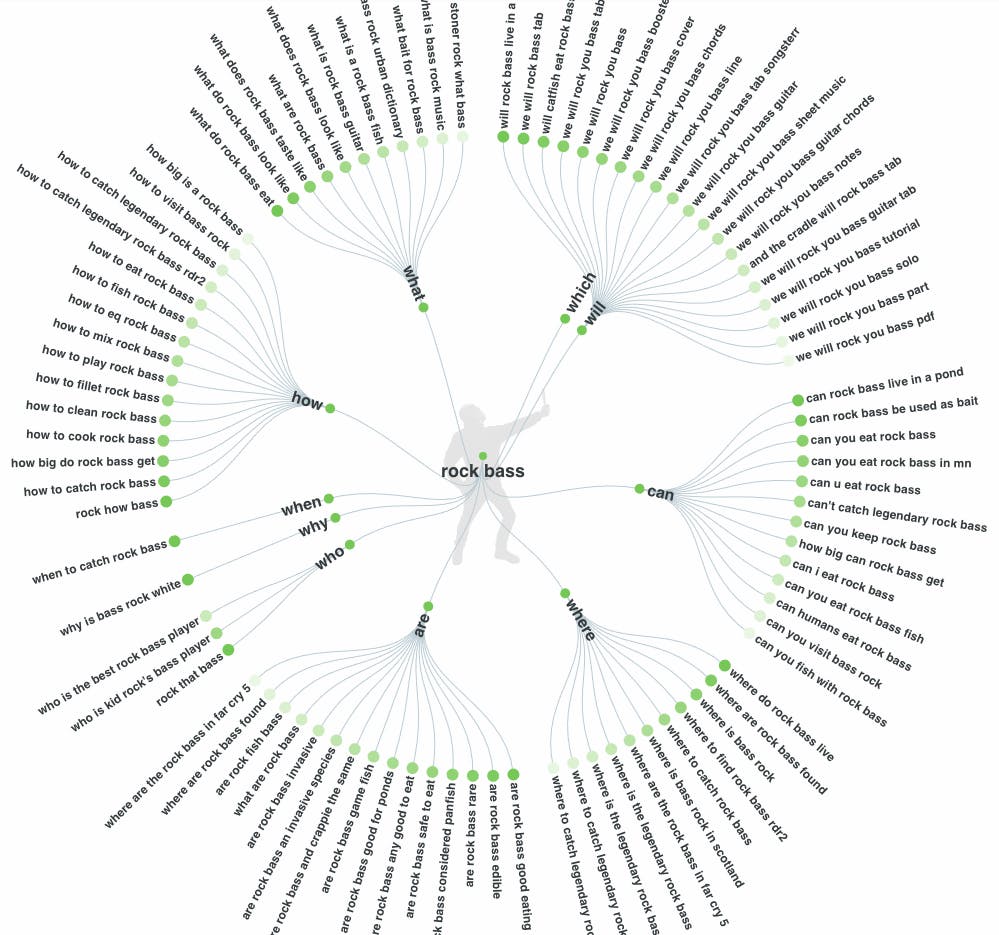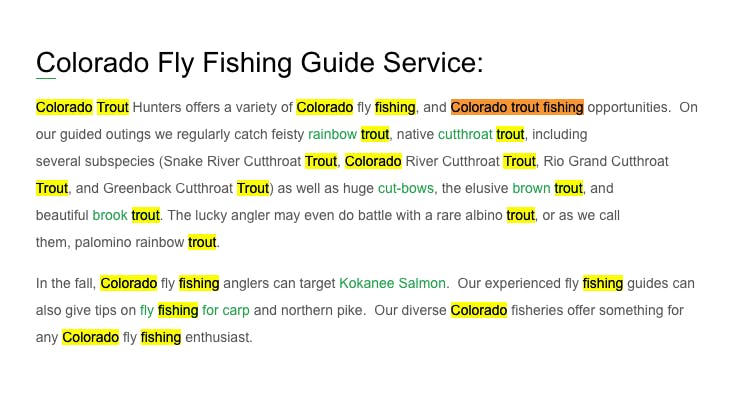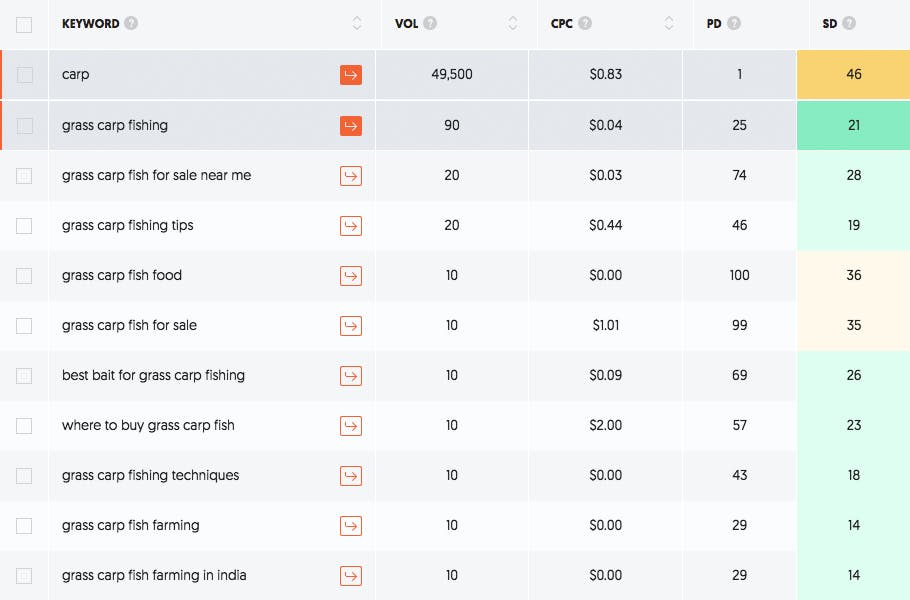Search terms and keywords are often mixed up by non-SEOs (search engine optimizers). However, the difference between the two is actually pretty simple once explained. Keywords are what you use to rank for search terms. Keywords are shorter sets of words that SEOs implant into your site to draw in visitors. The many variations of those keywords which people type into search engines like Google are the search terms.
Search Terms are what You want to Rank For

Search terms are what a user types into Google, also known as queries. Let’s pretend we have a local fishing tour business we want to rank. But before we attempt to rank for a specific search term, we need to determine which terms are worth the effort. To do this, there are a few tools at an SEO’s disposal. Google itself is a great option because when you type in a query it will offer related suggestions searched by other users. Then there are the more specialized tools such as AnswerThePublic.
So after doing some research, we’ve determined that “best bass fishing in Pennsylvania” is a good search term to target. Let’s break down why this term is a good choice. “Best” is an adjective people tend to use in search queries, so it’s a good inclusion. “Bass fishing” is the main focus of the user’s search and the general term we’re targeting for our business. And “in Pennsylvania” narrows down the search locally. If our fishing tours are based out of Pennsylvania, we don’t exactly want visitors looking to fish in Colorado coming to our site.

Keywords are what You Use to Rank
Keywords are what you include in your copy to rank for search terms on the SERPs (search engine results pages). So if our fishing tours business expanded into Colorado, we might want to include keywords like “trout fishing,” “Colorado trout fishing,” and “Colorado river fishing.” into some of our copy. These keywords are focused on ranking for different search terms, not “best bass fishing in Pennsylvania.”

The fact that different keywords will help you rank for different search terms is important. It may seem obvious that the keyword “Colorado trout fishing” won’t help you rank for the search term “best bass fishing in Pennsylvania,” but there’s more to it than that. Even “trout fishing,” “Colorado trout fishing,” and “Colorado river fishing” will rank for slightly different keywords. It’s important to figure out exactly which keywords will help you rank for the specific search terms you’re targeting.
And, to add another layer of complexity on top, it’s not as if keywords and search terms are one-to-one. “Trout fishing” and “Colorado trout fishing” may rank for some of the same search terms. And yes, that’s terms with an “S.” One keyword can potentially rank for dozens of related search terms. However, this generally won’t happen. You might rank for a few, but there are so many competing keywords for each search term it’s impossible for you to rank for all possible search terms for any given keyword. You may find that the same keyword, “Colorado river fishing” ranks you in position #5 for one search term and position #42 for another.
Oh, and generally speaking when an SEO says that something “ranks” there are two possible definitions. Sometimes ranking refers to being in the top 100 results, and other times it refers to being in the top 10.

Search Term Volume vs. Difficulty
Not all search terms are created equal. Some have higher volumes of traffic, others lower. Some are easier to rank for, others harder. The so-called “holy grail” search terms are those with both a high volume and low difficulty. As you may have surmised from the name “holy grail,” these search terms are not common. So as a general rule, the higher the search volume, the higher the difficulty.
So does this mean smaller sites are unable to compete with larger ones in the SERPs? No, but smaller sites will have to get a bit more crafty in how they go about ranking until they make a name for themselves. Long-tail keywords are one possible solution. These keywords target extremely specific search terms that generate highly qualified leads. They may have a much lower volume than the big-ticket search terms, but they’re easier to rank for and because they’re so specific you can be sure most people who find your site from them are ready to convert.

Perhaps our fishing tour business wants to target potential customers looking to catch carp, not just bass and trout. After all, “carp” has a large search volume. However, ranking for “grass carp fishing” is another option. It doesn’t have nearly as many searches, but it is easier to rank for and specifically targets people looking to fish for a certain kind of carp. These searchers know what they want and are more likely to become new customers.
Just as some fish are harder to catch than others, some search terms are harder to rank for than others. They might require more time to build up authority, more knowledge of how Google’s rankings work, or specific keywords strategically placed throughout your content.

Good vs. Bad SEO Practices
Good SEO practices are like good business practices. They aren’t a guarantee that you’ll be successful in the long run, but they definitely improve your chances. Bad SEO practices are just the opposite. You might see some quick returns from them, but in the long run, your site (or business) is going to suffer.
Let’s start with a bad SEO practice — keyword stuffing. Back in the day, this was a great way to rank for a bunch of search terms, but today it’s frowned upon by Google. This is when you cram as many keywords into your copy as you can. In response, you may see your site get a manual penalty from Google, or Googlebot will mark your site as spam. It’s the same as if our fishing tour business electrified the pond to catch all the fish. Sure, it means our immediate customers get a lot of fish, but it’s not a sustainable business model because now there are no more fish in the pond.
A good SEO practice is to use what is known as content clusters. These are groups of content pieces about various topics related to a “pillar topic.” By having a bunch of related content all internally linked to each other (where internal links make sense), we’re building up our site’s authority on the pillar topic. Google likes to rank highly authoritative sites because they tend to give searchers what they’re looking for. This is like if our fishing tour company sprinkled bait around the boat to lure fish in for the customers.
Conclusion
Search terms and keywords are not the same — but they are related. Keywords are what SEOs use to rank a website for search terms on search engines. And search terms are what users type into search engines to find websites. They’re two sides of the same coin.
Some search terms are harder to rank for than others, but as long as you stick to the good SEO practices you shouldn’t run into trouble. SEO takes a long time, so just because you don’t see immediate improvements in your site’s rankings or traffic, doesn’t mean it isn’t working. If you don’t catch a fish in the first 5 minutes do you give up and go home? Of course not! You persist, try different spots on the lake, and experiment with different bait. SEO is the same way. If you put in the time and effort, eventually you’ll begin to see improved results.
Reel in Customers with Media Proper SEO
Media Proper is the fishing tour guide for your website. We’ll help you navigate the waterways of Google to find the fish you want to catch. With a customized content strategy, we can help your site rank and get in front of your target audience. Whether you’re a small business looking for local customers or a large corporation with a national presence, you can benefit from the right SEO. Contact Media Proper today for more information about the variety of SEO and SEM practices we can put to work for your business.

